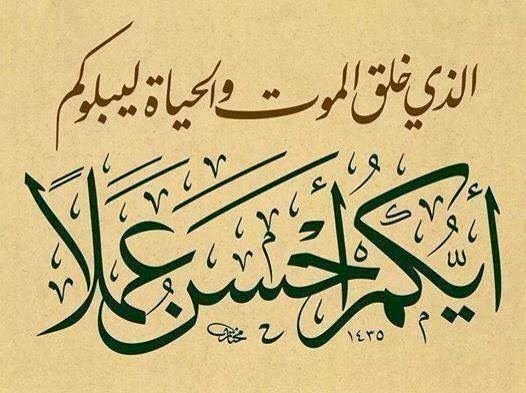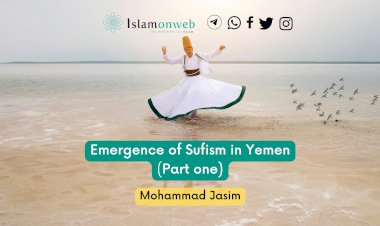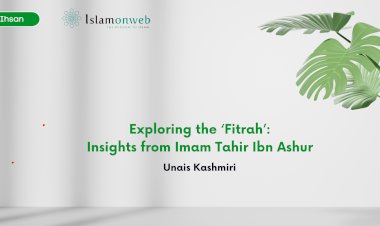Modalities of the Evolution of a Muḥsin
"He is the One Who created death and life in order to test which of you is best in deeds. And He is the Almighty, All-Forgiving" (Quran 67:2). Here the Quran uses the term "Iḥsān", which means the entire worldly life itsealf is to test that who can do the unmixed and undiluted deeds and focus his action to the pure unity of Allah. The concept of Iḥsān directly explains the idea of the divine unity of Allah. His absolute unity and uncompromising agreement to tawhīd, where no partnership can be associated with his glorious existence (wujūd) or self (dhāt).
The famous 'Iḥsān Hadith' narrated by Umar (r) on Islam's basic principles can be read in that spirit. It explicitly spells out the nature of a very sanctified, impeccable, and undiluted way of praying to and experiencing the Almighty. "You should worship Allah as if you see Him, for even if you cannot see Him, yet He sees you" (Muslim, Hadith No: 2). A worshipper must keep his mind concentrated on a non-diverted divine conversation, with the feeling that He observes you meticulously even at your breath-in and breath-out. Considering the prayer as the renewal of divine consciousness at every interval of our life, this feeling of divine surveillance is how a slave of Allah makes the sacred remembrance alive, which is the teleological finality of human life.

Gradually, a divine objective started drifting away from the intentional, social, cultural, and political spaces after the four virtually guided Caliphs. Scholars had to take the issue seriously and act spontaneously. Sufis, like Hasan Al Basari (d.728 AD) of the 8th century, realized the need for engraving the divine presence in all worldly transactions at a psychic level and day-to-day social life. He involved, more importantly, in the post-Caliphate political milieus where the secular values took the role of a dominant playmaker.
Consequently, the Sufi movements emerged, and the discipline of Taṣawwuf evolved in the Islamic world in the second century after Hijrah. The selfish secular intentions, insincere political interventions, and the brutal absence of divine vicegerency are the leading cause for the systematization and codification of Sufi practices, training modalities, Sufi chains (Tarīqah) and an academic discipline. Social need is the birth ground of social institutions as well as epistemological variants.
Also Read :Who is the First Teacher of Humanity?
Is Muḥsin Self-Made or Created?
Internalization of Iḥsān values and personification of Muḥsin can happen at two levels; (1) by the help of internal forces of a person like self-conscious personal efforts; and (2) by the support of external forces, like receiving a systematic training from a Sufi master. The first one can be made through divine remembrance (Dhikr Allah), a conscientious feeling of divine presence in all routine works and the second one by following a reliable and his guidance in worldly and otherworldly affairs.
Through either level, one may achieve the absolute goal of finding and experiencing the oneness or unity of Allah, which is the objective of Iḥsān. Often, it is a fight against all odds, including the physical, biological, and socio-cultural temptations. Also, it is an uncompromising challenge to the nature of the human self. Many fail in continuous compliance to reach out to the intended goal as well. Therefore, it is difficult to conclude that all Murīds (Sufi disciples) trained under a Sufi master are Sufi or Waliyy. Moreover, the emergence of "Waliyy" (greater Muḥsin/Sufi) out of a technically non-trained, a-systematic person because of his sincere self-training is also possible.

Can a Sinner be Muḥsin?
A sinner can also be a Muḥsin, provided his sincerity and God-consciousness in his all-other deeds. A person's intention to actualize and attract divine love and presence throughout his actions, interactions, and transactions leading him to the state of Muḥsin. A Muḥsin is always graced with the mercy (Raḥmah) of Allah, which leads to forgiveness (Maghfirah), as the Quran (7:56) asserts. Such sinners are the best and the most successful who benefits from Al-Ghaffār, Al-Ghafūr and Al-Ghāfir, the divine attributes of Allah.
Similar mentions of getting divine love and forgiveness are found in the Quranic stories of different prophets who achieved such divine graces after their humane errors in their life. In other words, it was the Iḥsān which got encrypted in the life of Ādam, Yūnus etc. and caused for the regaining status of infallibility. They were forgiven because they were Muḥsinūn, as Quran repeats in different verses. Muḥsin always could win the love of Allah (3:134, 147) and multiply his rewards from Allah (2:58, 7:161, 10:26).
In a nutshell, Iḥsān is the highly sought-after attribute of a Muslim, so that he can rise to the third and final stage of being Muḥsin after being a Muslim and Mu'min.
(Dr Muhammed Madappalli is currently working as a Post Graduate Teacher at Birla Public School in Qatar. He is also a Section Editor of the English edition of Islamonweb. He started his career as an Assistant Professor of Sociology at Lovely Professional University, Punjab, India. )
Disclaimer
The views expressed in this article are the author’s own and do not necessarily mirror Islamonweb’s editorial stance.
























Leave A Comment